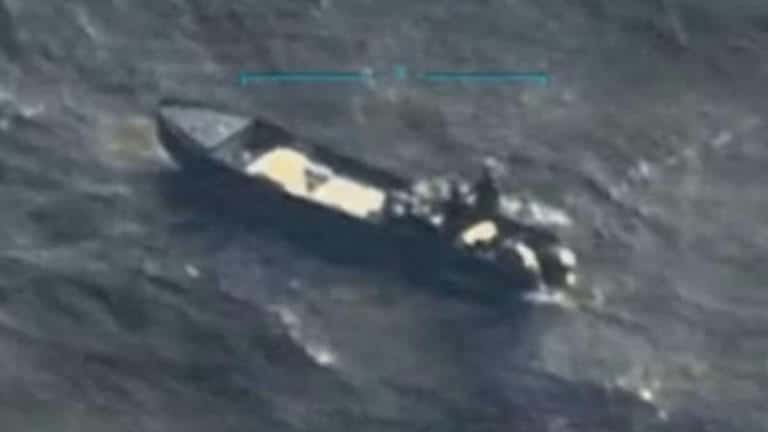In 2003 the U.S. Justice Department’s Office of Legal Council (OLC) issued a memo which declared the use of torture in ‘authorized military interrogations’ as legal when done under the ‘president’s constitutional authority to direct a war’.
The memo was widely condemned. The Obama administration withdrew it but refrained from prosecuting the torturers which had used it as cover.
The Trump administration now issued a comparable OLC memo to justify its wanton killing of alleged drug smugglers at sea.
Starting in September the Trump administration announced 19 strikes on boats in the Caribbean which have killed at least 76 seafarers. Most of them were random poor people:
One was a fisherman struggling to eke out a living on $100 a month. Another was a career criminal. A third was a former military cadet. And a fourth was a down-on-his-luck bus driver.
The men had little in common beyond their Venezuelan seaside hometowns and the fact all four were among the more than 60 people killed since early September when the U.S. military began attacking boats that the Trump administration alleges were smuggling drugs.
The argument of the new OLC memo is even more frivolous (archived) than the torturous reasoning of the former one:
The opinion, which runs nearly 50 pages, also argues that the United States is in a “non-international armed conflict” waged under the president’s Article II authorities, a core element to the analysis that the strikes are permissible under domestic law.
The armed-conflict argument, which was also made in a notice to Congress from the administration last month, is fleshed out in more detail by the OLC. The opinion also states that drug cartels are selling drugs to finance a campaign of violence and extortion, according to four people.
That assertion, which runs counter to the conventional wisdom that traffickers use violence to protect their drug business, appears to be part of the effort to shoehorn the fight against cartels into a law-of-war framework, analysts said.
The true purpose of drug cartels is obviously to make money. There is no evidence that any drug cartel ever has been or is in business because it wanted to create violence.
By framing the military campaign as a war, the administration is able to argue that murder statutes do not apply, said Sarah Harrison, a senior analyst with the International Crisis Group and a former Pentagon lawyer. “If the U.S. is at war, then it would be lawful to use lethal force as a first resort,” she said. The president, she argued, “is fabricating a war so that he can get around the restrictions on lethal force during peacetime, like murder statutes.”
There is nobody internationally who will accept such a stupid argument as justification for blowing up random boats at sea.
UN officials have condemned such strikes:
Volker Türk, the U.N. High Commissioner for Human Rights, has called for an investigation into the strikes, in what appeared to mark the first such condemnation of its kind from a United Nations organization.
…
“These attacks and their mounting human cost are unacceptable,” Ravina Shamdasani, a spokeswoman for Türk’s office, relayed his message on Friday at a regular U.N. briefing.“The U.S. must halt such attacks and take all measures necessary to prevent the extrajudicial killing of people aboard these boats.”
She said Türk believed “airstrikes by the United States of America on boats in the Caribbean and in the Pacific violate international human rights law.”
At the recent meeting of the G7 foreign ministers the French publicly declared that any such boat strikes are illegal:
In what appears to be the most significant condemnation so far from a G7 ally, France’s foreign minister says that the deadly boat strikes carried out by the United States in the Caribbean since early September violate international law.
…
“We have observed with concern the military operations in the Caribbean region, because they violate international law and because France has a presence in this region through its overseas territories, where more than a million of our compatriots reside,” Barrot said.
Britain is allegedly withholding some intelligence from the U.S. because of concern about the boat strikes.
U.S. Secretary of State Marco Rubio denies that but British officials confirmed their standpoint:
Marco Rubio has denied claims Britain stopped intelligence sharing with the US over its strikes on “narcoboats” in the Caribbean.
…
It was a “false story”, Mr Rubio said, adding the US had a strong partnership with the UK.
…
However, British officials reportedly believed the strikes, which have killed at least 76 people, break international law and agree with an assessment by the UN’s human rights chief that they amount to “extrajudicial killing”.
Colombian President Gustavo Petro has likewise stopped intelligence sharing on the issue:
“The fight against drugs must be subordinated to the human rights of the Caribbean people,” Petro said on X.
Earlier this fall, Petro accused U.S. government officials of murder, alleging that a casualty of a mid-September strike was an innocent Colombian fisherman.
Anyone in the U.S. intelligence services and military should be aware that taking part in such strikes is a criminal endeavor which may get them prosecuted in international courts.
The OLC memo is a way too flimsy a cover to protect anyone.
An admiral recognized this and skipped out:
Top officers, including Adm. Alvin Holsey, the head of Southern Command, sought caution on such strikes, according to two people, who like several others interviewed for this story spoke on the condition of anonymity because of the matter’s sensitivity.
Holsey wanted to make sure any option presented to the president was fully vetted first, one person said. In October, he abruptly announced he was resigning at year’s end, which will be about a year into what is typically a three-year assignment.
More soldiers should follow the man’s example.
Reprinted with permission from Moon of Alabama.

